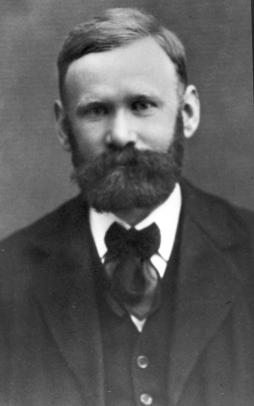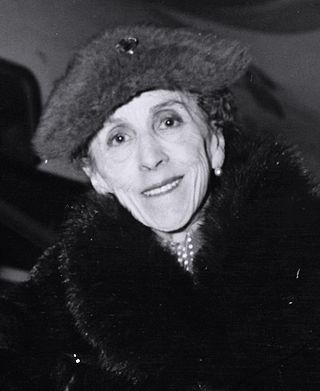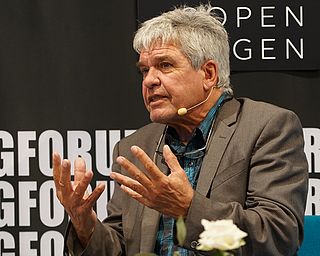
Agner Krarup Erlang was a Danish mathematician, statistician and engineer, who invented the fields of traffic engineering and queueing theory.

Baroness Karen Christenze von Blixen-Finecke was a Danish author who wrote in Danish and English. She is also known under her pen names Isak Dinesen, used in English-speaking countries, Tania Blixen, used in German-speaking countries, Osceola, and Pierre Andrézel.
The Tagea Brandts Rejselegat is a Danish award to women who have made a significant contribution in science, literature or art. The grant, which is given without application, was created and endowed by Danish industrialist Vilhelm Brandt (1854–1921) in 1905 in honor of his wife, Tagea Brandt. It is awarded annually on 17 March, her birthday. The charter of 1922 provides that it shall be given to outstanding women in science, art, music, literature and theater arts. The intent is for the awardee to both broaden her horizons while promoting Danish society abroad, and to benefit from vacation and rest time.

Robert Julius Tommy Jacobsen was a Danish sculptor and painter. The Danish Robert Award is named in his honor.

Andreas William Heinesen was a poet, novel writer, short story writer, children's book writer, composer and painter from the Faroe Islands.

Danish literature a subset of Scandinavian literature, stretches back to the Middle Ages. The earliest preserved texts from Denmark are runic inscriptions on memorial stones and other objects, some of which contain short poems in alliterative verse. In the late 12th century Saxo Grammaticus wrote Gesta Danorum. During the 16th century, the Lutheran Reformation came to Denmark. During this era, Christiern Pedersen translated the New Testament into Danish and Thomas Kingo composed hymns. Fine poetry was created in the early 17th century by Anders Arrebo (1587–1637). The challenges faced during Denmark's absolute monarchy in 1660 are chronicled in Jammersminde by Leonora Christina of the Blue Tower. Ludvig Holberg (1684–1754), influenced by the ideas of the Enlightenment and Humanism, is considered the founder of modern Danish and Norwegian literature. Neoclassical poetry, drama, and the essay flourished during the 18th century influenced by French and English trends. German influence is seen in the verse of the leading poets of the late 18th century such as Johannes Ewald and Jens Baggesen. Other 18th century writers include the hymn writer Hans Adolph Brorson and the satirical poet Johan Herman Wessel.

Klaus Rifbjerg was a Danish writer. He authored more than 170 novels, books and essays. In 1965 he co-produced the film 4x4 which was entered into the 4th Moscow International Film Festival.

Ib Michael is a Danish novelist and poet. His writing style has been described as magic realism.
Kirsten Thorup is a Danish author.
The Ben Webster Prize is an annual jazz award set up by the Ben Webster Foundation to honour Danish and American jazz musicians as well as other professionals active in the promotion of jazz in those countries. The American jazz musician Ben Webster spent his last ten years in Copenhagen, Denmark, where he became an active part of the city's thriving jazz scene. After his death, the Ben Webster Foundation was set up to channel his annual royalties to musicians in Denmark and America. The Ben Webster Prize is part of this effort.
The Grand Prize of the Danish Academy, founded in 1961, is the most notable of Denmark's literature prizes and awards. It is awarded by the Danish Academy. Until 1982, it was handed yearly, but since then it has been given every second year. The first years the prize was 50.000 DKK. In 1982 the Cultural Ministry of Denmark increased the prize to 100.000 DKK. From 1992 to 1997 it was 200.000 DKK, in 1998 it was 250.000 DKK and since 2000 it has been 300.000 DKK. The prize is a recognition of a writers work as a whole and not only for one book.

De Gyldne Laurbær is a Danish literature award, which was established in 1949. The award is handed by The Committee De Gyldne Laurbær, formerly Boghandlerklubben. The prize is given annually in February or March. Originally the award was a laurel wreath, a golden pin with an inscription, some money and a book gift worth 2500 DKK. Today the award is a laurel wreathe, a diploma and a book gift worth 2500 DKK. The award is handed at a ceremony arranged by the publishing house which has published the winning book and by the Committee De Gyldne Laurbær. Early in January every year the committee sends out ballot to all the Danish bookshops, which then give their vote for a Danish book which was published the year before. An author can only win The Golden Laurel once-in-a-lifetime, so the bookshops can not vote for an author who has already won the prize once before. The winner is usually one of the bestsellers among the Danish books. On the day when it is decided who wins the Golden Laurel, the president of the Committee of The Golden Laurel informs the winner about the award, while journalists follow the event.
The Danish Critics Prize for Literature is an annual Danish literature award. It was established in 1957 by the Danish Publishers Association. Since 1971 the award has been made by the Danish Literature Critics Association after a vote by members. The award currently carries a prize of DKK 30,000. The Association also awards the Georg Brandes-Prize.
The Holberg Medal is an award to a Danish author of fiction or writer on science. It is an appreciation of a literary or scientific work or of the award winner's authorship as a whole. The prize is often awarded on 3 December, the birthday of Ludvig Holberg. The first award was given in 1934 in connection with the 40th anniversary of the Danish association of authors.
Klaus Rifbjerg's Debutant Prize was founded in 1983 by Danish author Klaus Rifbjerg, it is awarded every second year to a poet debutant, who has published his or her first collection with poems within the last two years. The poems must be written in one of the three main languages of the Danish Kingdom: Danish, Faroese or Greenlandic.
The Otto Gelsted Prize is a Danish literary award which was founded in 1970 by the Otto Gelsted Memorial Fund, heir of the Danish author Otto Gelsted (1888–1968). The prize is awarded annually by the Danish Academy; it is currently 65,000 DKK.
The Beatrice Prisen was founded in 1983 by Birthe and Paul Beckett. The prize is awarded annually by the Danish Academy, it is currently DKK 50,000. The prize is handed to an author who writes either lyrics or prose, and whose "published books already have a quality, which there is reason to appreciate, and where there is reason to believe, that he or she will develop further."
The Kjeld Abell Prize is a Danish cultural award which is handed every second or third year to a person, who has made a great effort for Danish theatre or film.
The Lauritzen Award is a Danish film award which is handed every year to a female and a male Danish actor once a year by the Lauritzen Fonden.
Klaus Mølmer is a Danish physicist who is currently a professor at the Niels Bohr Institute of the University of Copenhagen. From 2000 to 2022, he was a professor of physics at the University of Aarhus.








